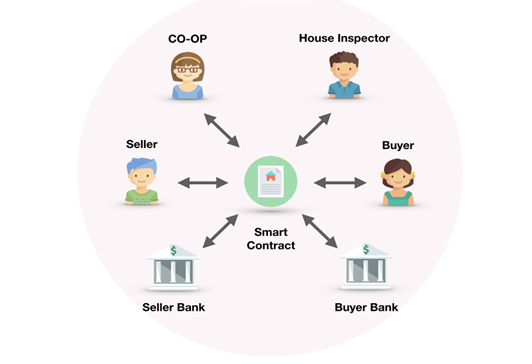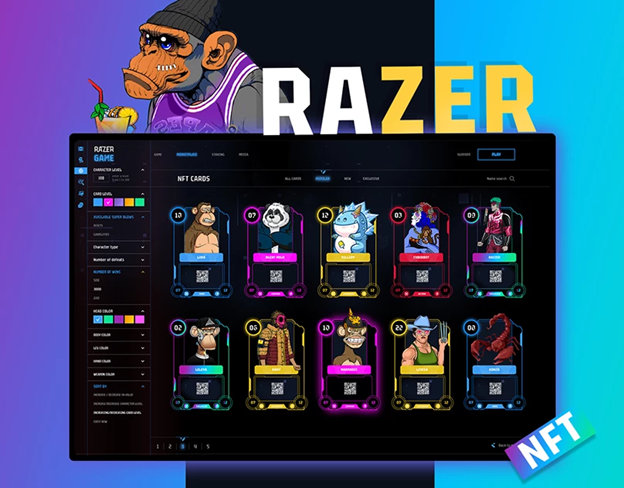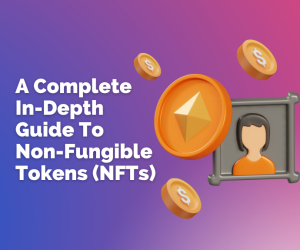Smart Contract in Private Blockchain: All You Need To Know
- August 24, 2023
- 1666 views
- 16 minutes

The evolution of the blockchain goes outside the limits of payment systems and now powers the foundation of decentralized applications. Smart contracts are one of the most critical elements of such applications or platforms.
The term “Smart contract” is a principal component of distributed ledger technology or Blockchain. Its role is quintessential in the sense that the execution of agreements between the participants in the blockchain network is ascertained through smart contracts.
Most importantly, transparency, security, and efficiency in transactions are assured with the integration of smart contracts in a blockchain. To put it simply, smart contracts are similar to any typical contracts that are used for establishing the terms and conditions of an agreement.
In this blog post, we will be talking about the significance of smart contracts in a private blockchain.
Table of Contents:
1. Introduction
Definition of Smart Contract
In technical terms, smart contracts are self-enforcing digital contracts stored on a blockchain, either a private or public network, that process agreements between two or more parties when the pre-determined terms and conditions are met.
As the definition explains, smart contracts typically automate the process of contract execution without any third-party or intermediary involvement.
Participants among which the agreement takes place are certain and aware of the outcome of the contract. Hence, smart contracts prevent time loss by speeding up the contract execution and enforcement procedures.
To put it briefly, self-executing virtual agreements are called smart contracts that ease the transfer of assets or properties. By automating the workflow, it decides the next course of action when the protocols are fulfilled by the participants.
Overview of Private Blockchains
A private blockchain is a permissioned blockchain network that is developed, maintained, and controlled by private entities for a secured and transparent exchange of information or transactions across the network.
It is a partially decentralized and peer-to-peer distributed network with a central point of authority and private control. The creators and administrators have control, whereas selected participants (say stakeholders, partners, or employees) have permissioned access to this private network.
Unlike a public blockchain which is a permissionless blockchain, no one can join or access a private blockchain without an invitation. Some of the prominent examples of private blockchain are Hyperledger, R3 Corda, Ethereum Enterprise, and Ripple.
Also Read: Introduction to Private Blockchain: A Beginner’s Guide
2. Benefits of Using Smart Contracts in Private Blockchains
With its technological prowess, smart contracts in private blockchains bring substantial benefits to the business and corporate sectors. By eliminating the need for intermediaries or controlling authorities to oversee, verify, and validate transactions, these virtual agreements obviate delays and reduce fees.
Here is a quick go-through of the exceptional advantages of integrating smart contracts.
Efficiency & Accuracy
Smart contracts are enforced and executed automatically with great speed and accuracy. Since everything is digitalized and automated, much time gets saved that otherwise would have gone to dealing with paperwork.
Earlier, documentation of contracts was done manually by humans. This is the reason a lot of time was spent rectifying errors. But smart contracts leave no room for chances of committing errors.
Cost savings
As mentioned in the previous section, with smart contracts, you don’t need any third-party assistance to process transactions. This substantially reduces your associated fees.
Without any interference from intermediaries, the process of contract execution also gets streamlined, thus resulting in noteworthy time savings.
In addition to this, smart contracts promote autonomy as you no longer have to rely on an outsider or third party to validate and confirm the agreement. Eventually, you can prevent any kind of manipulation or influence.
Increased security
Another feature of smart contracts that holds paramount importance in a private blockchain is the security of transactions and information exchange. Smart contract developers leverage cryptography technology to keep information in digital contracts safe from infiltration for personal gain.
As a consequence, the records stored in the network are impossible to hack or tamper with because they are end-to-end encrypted. Each entry stored in the blockchain is linked to past and subsequent transactions, thus making the entire chain secure against alteration by any hacker.
Transparency
The above point brings us to the next advantage – improved trust and transparency. Since all records are end-to-end encrypted and there is no involvement of third parties, it builds trust among the network members.
They are no longer doubtful about the privacy of the transactions shared in the closed network. This decentralized and tamper-resistant nature of transactions ensures that editing, removing, or altering records for personal gain becomes an impossibility.
Backup
The fear of data loss is reduced to a great extent when transactions are executed using smart contracts in a blockchain. Records are digitally documented and duplicated every single time a new transaction is made.
Original data can be restored anytime on any other device by anyone having authorized access to the blockchain. In other words, it can be said that blockchain is the most reliable backup method because every node has a copy of the distributed ledger.
3. How Smart Contracts Work in Private Blockchains
Just like traditional agreements, smart contracts work on “if, when, then..” statements except for the fact everything is written in codes in a private blockchain. Earlier, terms and conditions in a contract were put in manually by humans, but now the scenario has completely changed for the better.
The next segment highlights the function and mechanism of smart contracts between parties.
How smart contracts are created and executed
Although smart contracts work in a similar manner as traditional contracts, the process of contract enforcement and execution is entirely automated. While standard and conventional contracts are enforceable by law, it is the programming codes that enforce a smart contract.
Here is a step-by-step explanation of how smart contracts are created by blockchain development companies and how they work.
- Step 1: Business teams collaborate with developers to define criteria for desired smart contract behavior. They intricately outline the specific criteria that the smart contract should adhere to.
- Step 2: Simple and straightforward events like payment authorization, reaching a predefined threshold on a utility meter reading, or shipment receipt become conditions for the contracts.
- Step 3: Complex operations might be encoded through the integration of sophisticated and intricate logic., Some instances are valuing derivatives automating insurance payments, etc
- Step 4: In this step, developers use a smart contract writing platform, where they construct and thoroughly assess the logic underpinning the contract. Once it is done, the contract undergoes scrutiny by a separate team specializing in security testing.
- Step 5: Either an internal expert or a specialized company scrutinizes smart contract security to ensure that every potential vulnerability is addressed and mitigated.
- Step 6: Once authorization is completed, the contract is deployed on an existing private blockchain or any other distributed ledger infrastructure.
- Step 7: This step involves configuring the smart contract to listen for event updates from a cryptographically secure “oracle” data source after it is deployed.
- Step 8: As the smart contract is finally prepared, it starts receiving the required events or series of events from one or multiple Oracle sources. Thus, the smart contract executes seamlessly its programmed tasks with absolute accuracy.
Examples Of Smart Contract Use Cases In Private Blockchains
With the growing popularity and increase in the adoption of private blockchain platforms, enterprises and stakeholders realized that this distributed ledger technology could actually turn out to be a pathbreaker in accelerating their business processes.
Here we have put forward some of the noteworthy use cases where smart contracts applications are exemplary in the private blockchain arena.
Smart Contract in Finance
Traditional financial services such as trading funds, lending, borrowing, and a host of various other services are gradually being replaced by digital solutions. All thanks to the decentralized, immutable, and trustless attributes of blockchain.
Decentralized finance (DeFi) applications, also known as dApps, are integrated with smart contracts functionality that promotes transparency in financial transactions, reduces costs, and improves accessibility to financial services to people across the world.
Decentralized business models have already captured high value in the market collecting billions of dollars with their 24/7 functionality. With its remarkable characteristics, more and more users are seen participating in this new generation of decentralized finance services.
Although only a few years old, the finance sector has been favorably impacted by the smart-contract-enabled dApps, delivering great utility and value to the customers.
In fact, the private blockchain is disrupting the banking industry with its power to automate workflows, speed up transactions, facilitate quick cross-border payments, etc.
At this present time, as per the DappRadar Report, around 11,000 dApps are powered by smart contracts with an estimated figure of 1,52,000. Nearly 1.7 million dApps users engage with these apps on a regular basis where 28.5 million transactions are executed by them. This computes up to 6.6 billion dollars per day as the total incoming value.
Smart Contracts in Real Estate
Property rights management has become seamless with the introduction of smart contracts. Tokenization using smart contracts has advanced the process of creating, tracking, and assigning fractional ownership of assets.
Incorporating smart contracts and private blockchain automates the process of documentation and eases the transaction process. Furthermore, it lowers the barrier to entry of multiple investments as it merges blockchain with real estate transactions.
Property Buying And Selling Without Smart Contract
Property Buying And Selling With Smart Contract
There are a number of successful examples of the creation of digital tokens for real estate properties using smart contracts on blockchain networks such as SolidBlock and RealIT.
A recent example is the case of the Republic of Georgia, Caucasus Region. The country has been in the process of building a land title or property registration powered by blockchain technology since 2016.
Smart Contracts in the Corporate World
As per Senate Bill 69 passed by Delaware in 2017, businesses and large corporations can be managed by building blockchain-based Decentralized Autonomous Organizations (DAOs).
DAOs, with the use of smart contracts, can enable sophistication and control in their corporate structure by encoding business protocols and automatically enforcing incentive structures within the framework.
The significant advantages of DAO development in an organization are:
- Lower administrative costs in terms of less office space, less hiring, etc.
- Better and informed decision-making.
- Tasks automation with the use of smart contracts.
- Obviating the need for an intermediary or central point of authority.
- Reducing the chances of committing human errors.
Smart Contracts in Gaming
Despite the gaming industry being the most booming sector at present, its value is created and distributed inequitably within the industry. This hundred-billion-dollar gaming ecosystem continues to move with a one-directional money flow where players pay to play.
However, implementing blockchain technology and smart contracts in games can make it a two-way flow of income where players also get to earn by trading in-game assets. This is where Non-fungible tokens (NFTs) development comes into the picture.
Creation and tokenization of unique digital assets or collectibles become a part of the in-game content which players can exchange, buy, or sell. The process of NFT creation highly depends on smart contracts because the NFTs have to be rare, one-of-the-kind, and indivisible.
Blockchain in gaming underpins NFT development by seamlessly facilitating token ownership, immutability, interoperability, and provable scarcity. Together, these contribute toward an equitable value model for gaming, driving mainstream adoption.
Also Read: A Complete In-Depth Guide To Non-Fungible Tokens (NFTs)
4. Smart Contract Development in Private Blockchains
This goes without saying that smart contract development has become an important subject of interest for blockchain developers over the past few years. The benefits of private blockchain in business are manifold.
This is why small and large enterprises are thinking of switching to this distributed ledger technology with the help of smart contracts. The process of development involves multiple stages and most contracts are built on private blockchain Ethereum.
Languages Used To Develop Smart Contracts
Needless to say, smart contracts use computer programs, also called programming languages, to create digital contracts whose agreement terms are enforced automatically.
Here is the list of top smart contract programming languages –
- C++
This is perhaps the oldest programming language mentioned in the list. It is supported by blockchain projects that include Ripple, Stellar, and EOS.
Being a compiled language, C++ adds an extra stage to smart contract development. Compiling into Wasm code, makes the codes perform well.
- Clarity
This is comparatively a newer programming language used for writing smart contracts. Especially, for writing dApps, Clarity is the most preferred language by developers.
A novel characteristic of Clarity is that it’s a non-Turing -complete language. This allows for greater adaptability, thus making it more convenient to conduct static analysis and detect security issues before the final deployment of the smart contract.
- JavaScript
Although JavaScript (JS) is known worldwide for developing the front ends of websites and web applications, it is increasingly used in the creation of smart contracts.
Being an easy-to-use and learn programming language with a vast open-source community, JavaScript has become a good pick for building the frontends of decentralized exchange (DEX) platform development.
The top recognized blockchains that support JS are Ethereum, Hyperledger Fabric, Solana, Polkadot, and Neo.
- Python
Python supports a large variety of app development concepts which include structured and object-oriented programming. This feature allows developers to integrate advanced functionalities into existing applications.
Although Python is best suited for Artificial Intelligence-based apps, its ease of use and capabilities to support Ethereum, Hyperledger Fabric, etc. make it ideal for building smart contracts.
- Rust
Rust is designed for writing codes for compact, fast-performing, and robust applications, dApps being one of them. Therefore, this programming language is popular for building the backends of smart contracts effortlessly.
Rust-based apps are supported by blockchain platforms like Polkadot, Solana, Cosmos, Stacks 2.0, Aleo, and Open Ethereum.
- Solidity
Hands down to the most renowned Smart contract programming language, Solidity. It was introduced by Gavin Wood, the founder of Ethereum, in 2014.
This smart contract programming language is winning the hearts of developers by being simple, straightforward, and user-friendly. They can easily master the basics of writing codes for dApps with Solidity.
- Vyper
Being a subset of Python 3, Vyper is a contract-oriented programming language used for smart contract apps based on Ethereum. With Vyper, developers can write simple, short, and understandable codes.
With its extensive support for dApps development, Vyper makes it easy for developers to fix bugs easily and resolve other technical problems.
Smart Contract Development Frameworks And Tools
Besides selecting the best programming language, developers must devise a proper plan to decide the tools and frameworks for smart contracts which will be the component of success.
Above all, you need to find a trustworthy developer who has in-depth knowledge and technical expertise in Ethereum. The following section presents a brief explanation of the tools and frameworks utilized to design, develop, and deploy smart contracts.
- Smart Contract Frameworks – Truffle, Pinata, Alchemy, OpnZeppline, HardHat, Chainlink, Ganache, Geth, and Infura.
- Development frameworks – Ether.JS, Node.JS, Web3 JS, React JS, Next JS, Angular JS.
- Wallets – Metamask, Coinbase, Binance, Trust Wallet, and Wallet Connect.
- ERC Tokens – ERC 20, ERC 1155, and ERC 721,
Best practices for smart contract development and deployment
Smart contracts are defined by rules, just like traditional or standard contracts. Complex blockchain programs that empower smart contracts are experimental and subject to constant changes.
Therefore, best practices, philosophies, and approaches, need to be introduced by developers. Here we have pointed out some of the notable practices.
Simplicity & Modularity
To write a smart contract, simplicity is the key. Unnecessary complexities while writing codes welcome inefficiency which consequently increases the chances of errors.
Hence, it is wise to keep the contract logic as simple as possible and the code short and clear. Additionally, keeping the smart contract design to be modular is a best practice to follow.
Prepare for failure
Unfortunately, the majority of complex smart contracts are prone to errors, causing failure on its first try. Sometimes, even without any intricacies, there is always a probability of everything going on the wrong track.
So, it is better that the developers prepare themselves for such eventualities that can help you evade a catastrophic failure. Formulate a failure-proof upgrade strategy with measures for improvements and practices to resolve loopholes and fix bugs.
Code Optimization
Other than technical glitches and bugs, another factor that can impact your smart contract functionality is poorly optimized code. For efficient and cost-effective smart contract creation, a developer must aim for gas cost optimization.
Also, reuse or duplication of contract code can be adopted where it fits reasonable. However, it should be done using previously deployed smart contracts that are self-owned.
Stay up-to-date
Keeping track of the latest and trending developments is a necessary practice to follow if you want your contract to be secure, advanced, and bug-free. For this, you need to be open to recent security updates and techniques.
You should keep on checking the smart contract frequently for any new errors. Also, while using a tool, framework, and library for building smart contracts, you must always go for the upgraded or latest version.
Team up with a Professional Smart Contract Development Company
Working with an experienced developer from a reputed agency is always a good idea. A company that has a proven track record in smart contract development and a long-established reputation in the market will never disappoint you.
Webgen Technologies USA is one such company that has a team of smart contract developers with unmatched expertise and outstanding technical skills. We excel in the space of blockchain and smart contract development.
5. Challenges and Limitations of Smart Contracts in Private Blockchains
While there are numerous benefits of adopting smart contracts in the private blockchain, there are quite a few restrictions and obstacles associated with this smart technology.
Let us have a quick look at the downsides and inherent limitations of smart contracts.
- Scalability issues
Since smart contracts are stored on a private blockchain network, which is a single and shared ledger, it is difficult to change. So, if it encounters an error, the process of fixing it can be very time-consuming and quite expensive.
Also since the network is a shared one, it limits the number of transactions that it can process at the same time.
- Adaptability
The core foundation for the smart contract is logic-based execution which is enforceable by codes and followed by parties in good faith and with reasonable understanding.
However, the creation of a contract is subjective, and it is vital that every single person involved in the transaction understands and adheres to the legal implications. It is imperative for parties to deal fairly and not indulge in unethical activities for personal gain or interest.
- Integration with legacy systems
Another major challenge in the worldwide adoption of smart contracts is their acceptance in the legacy or existing contract systems. Non-technical parties find it difficult to understand the agreement terms provided in codes.
Therefore, in most cases, parties seek help from trustworthy technical experts to confirm whether the terms are accurate and acceptable. This condition is analogized to seeking legal help or hiring lawyers which usually happens in text-based traditional contracts.
- Regulatory and legal challenges
The issue of jurisdiction and regulatory compliance also hinders the adoption of smart contracts by most people. Since technology has no geographical boundary and is accepted globally, it becomes difficult to resolve conflicts or disputes that arise while enforcing smart contracts.
For instance, if the two parties are from two different countries or states, it is unclear which court of jurisdiction needs to be considered in order to resolve a dispute.
6. Future of Smart Contracts in Private Blockchains
There is no second thought about the fact that private blockchain platforms powered by smart contracts have grown to be a key driver of the crypto, finance, and real estate economy. But, the future holds great potential for its broader acceptance in other sectors as well.
Potential for wider adoption
The list of smart contract use cases in the real world is non-exhaustive because countless businesses from diverse industry verticals are showing keen interest in leveraging the fruits of blockchain and smart contracts.
Smart contract technology and dApps are used by integral sectors like healthcare, government, supply chain, cybersecurity, and others to overcome the major challenges and pain points in their operations which include identification, interoperability, and authentication issues.
Emerging trends and developments
With all of these proven use cases and the continuous discovery and development of technology trends, smart contracts are poised to enhance the process of digital agreements.
The use of smart contracts has enabled a new type of interaction between parties, which is embodied in the current and emerging trends and developments.
- Tokenized Investment Portfolio Management – Users can now create “smart portfolios” that are non-custodial and execute trades automatically on behalf of users at the current market prices. It tokenizes positions and offers portfolio owners advanced investment products programmed for seamless trade execution.
- Synthetic Assets – The whole DeFi revolution is driven by two factors – transparency and security. With decentralized smart contract protocols, the synthetic assets are longer controlled by central authorities, but by a distributed ledger that verifies and validates every transaction.
- Automated Asset Management – With smart contracts, both the execution of asset transactions as well as management of asset portfolios are automated. It automatically keeps track of current trading strategies at regular intervals to ensure steady profit earnings.
- Liquidity of Financial Markets – The arrival of automated market maker systems enabled by smart contracts and algorithmic trading are substituting the classic methods of increasing finance market liquidity. DEX platform and P2P dApss are easily accessible to anyone in any part of the world for trading cryptocurrencies without the need for an intermediary.
- Algorithmic Stablecoins – Stablecoins are now algorithmic in the sense that the value of these coins is determined by smart contract algorithms. Since they are longer supported by paper money, it leads to lower transaction costs, faster settlement, and higher liquidity.
7. The Bottom Line
Although a complex logic process, the potential of smart contracts goes beyond the simple property or asset transfer. From legal proceedings to paying insurance premiums, and real-time auditing to risk assessment, its scope is ever-expanding.
Therefore, the true evolution will come from whole new paradigms that we have not yet imagined. Today, the smart contract market is growing rapidly with great speed and innovation.
Building smart contracts makes it possible for us to experience the great progress underlying the symbiotic relationship between blockchain and fintech systems.
That’s all for today! Thanks for reading. Stay tuned for more informative articles on smart contracts, blockchain, DeFi, and more.

























